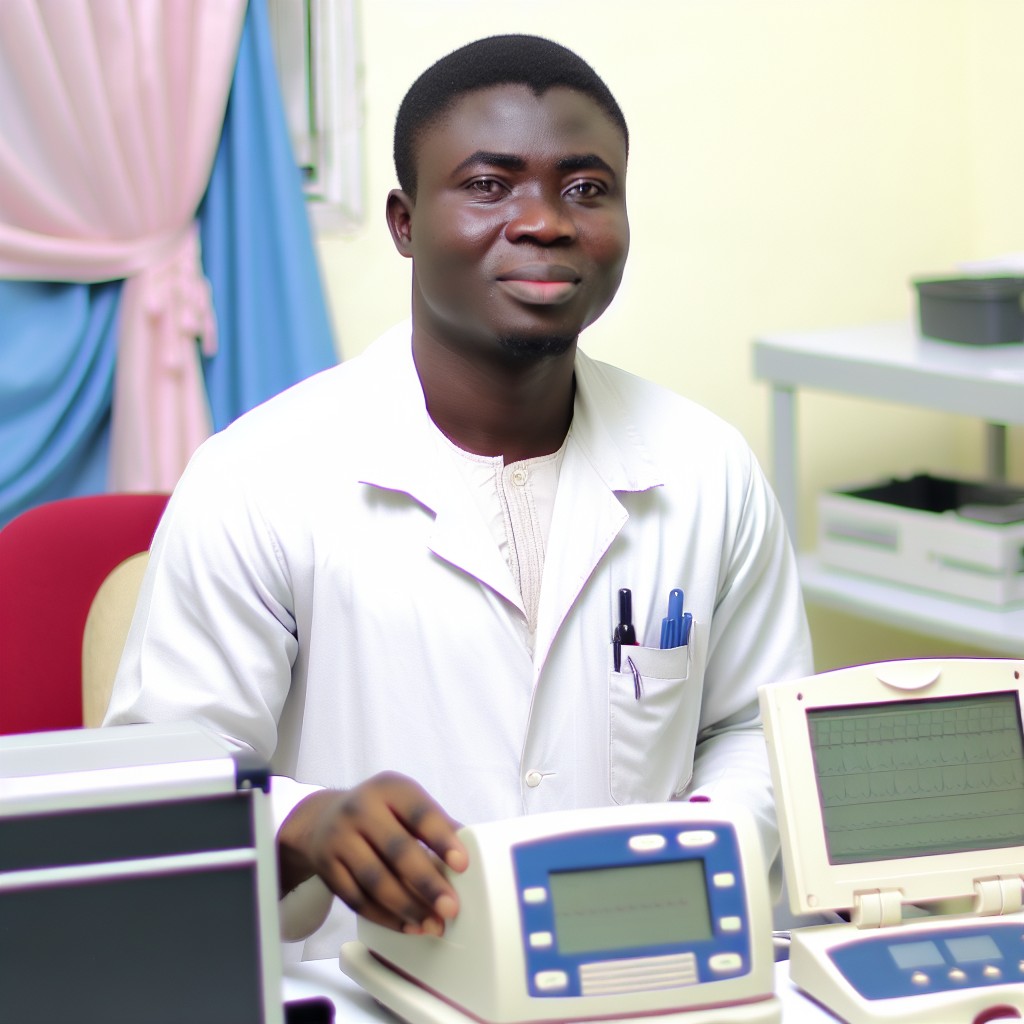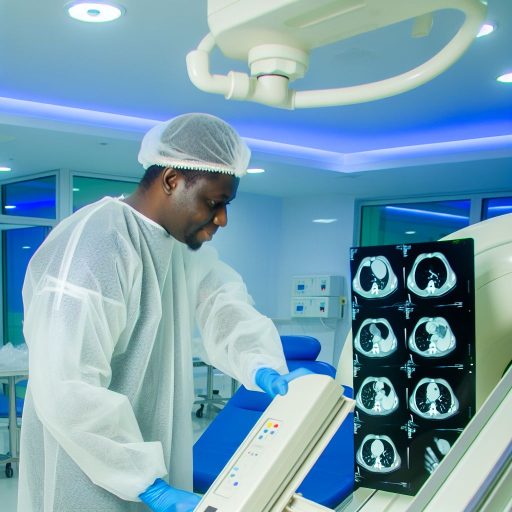Introduction
A brief overview of biomedical technology equipment in Nigeria is essential for understanding the healthcare sector.
These equipment play a vital role in diagnosing, monitoring, and treating various medical conditions efficiently.
The purpose of this blog post is to highlight the importance of these technological advancements in improving healthcare delivery in Nigeria.
Overview of Biomedical Technology in Nigeria
In recent years, Nigeria has seen significant advancements in the field of biomedical technology.
This has led to improvements in healthcare delivery, diagnosis, and treatment of various medical conditions.
However, there are still challenges that need to be addressed in order to fully utilize the potential of these technologies.
Current state of biomedical technology in Nigeria
Currently, Nigeria has a growing number of biomedical technology equipment being used in hospitals and healthcare facilities across the country.
These include diagnostic tools such as MRI machines, ultrasound scanners, and X-ray machines, as well as treatment devices like ventilators and dialysis machines.
Additionally, Nigeria has seen an increase in the use of telemedicine and remote monitoring technologies to improve access to healthcare services, especially in rural areas where there is a shortage of medical professionals.
These advancements have helped to bridge the gap in healthcare delivery and reach more people in need of medical care.
Challenges faced in accessing and utilizing biomedical equipment
Despite the progress made in the field of biomedical technology, there are still challenges that hinder the full utilization of these equipment in Nigeria.
One major challenge is the cost of acquiring and maintaining these technologies, which can be prohibitively high for many healthcare facilities, especially in rural areas.
Another challenge is the lack of skilled personnel to operate and maintain these technologies.
Training programs for biomedical engineers and technicians are limited in Nigeria, leading to a shortage of qualified professionals who can effectively use and maintain these equipment.
Infrastructure issues, such as poor electricity supply and inadequate maintenance of healthcare facilities, also pose challenges to the effective use of biomedical equipment.
Without reliable power supply, many hospitals struggle to keep these technologies running, which affects the quality of healthcare services provided to patients.
Importance of improving healthcare infrastructure through technology
Improving healthcare infrastructure through the use of biomedical technology is essential for enhancing the quality of healthcare services in Nigeria.
By investing in modern equipment and technologies, healthcare facilities can improve diagnosis accuracy, treatment outcomes, and patient care.
Telemedicine and remote monitoring technologies can help to expand access to healthcare services, especially in underserved areas where medical facilities are scarce.
This can reduce the burden on healthcare professionals and improve the overall health outcomes of the population.
Furthermore, integrating biomedical technologies into the healthcare system can lead to cost savings in the long run.
By accurately diagnosing medical conditions and providing timely treatment, hospitals can reduce the need for expensive procedures and hospitalizations, saving both money and lives.
List of Common Biomedical Technology Equipment Used in Nigeria
In hospitals and healthcare facilities in Nigeria, there are several essential biomedical technology equipment that play a crucial role in diagnosing and treating patients.
These equipment are vital in providing quality healthcare services and ensuring accurate diagnosis and treatment.
Below is a list of some common biomedical technology equipment used in Nigeria:
-
X-Ray Machine
The X-ray machine is a commonly used equipment in hospitals in Nigeria.
It is used to capture images of a patient’s internal structures, such as bones and organs, to diagnose medical conditions like fractures, infections, and tumors.
-
Ultrasound Machine
The ultrasound machine is another important equipment used in healthcare facilities in Nigeria.
It uses sound waves to create images of internal organs, tissues, and blood vessels, allowing medical professionals to diagnose various conditions, monitor fetal development during pregnancy, and guide medical procedures.
-
Electrocardiogram (ECG) Machine
The ECG machine is used to measure the electrical activity of the heart and is essential in diagnosing heart conditions such as arrhythmias, heart attacks, and other cardiac abnormalities.
It helps healthcare providers determine the overall health of a patient’s heart and plan appropriate treatment.
-
Blood Pressure Monitor
A blood pressure monitor is essential in measuring a patient’s blood pressure, which is crucial in diagnosing and monitoring conditions such as hypertension.
It helps healthcare providers determine if a patient’s blood pressure is within the normal range or if intervention is required to manage high blood pressure.
-
Defibrillator
A defibrillator is a life-saving device used to deliver an electric shock to the heart in cases of cardiac arrest or life-threatening arrhythmias.
It is crucial in restoring normal heart rhythm and saving lives in emergency situations.
-
Incubator
An incubator is used to provide a controlled environment for premature babies or infants who need special care.
It helps regulate temperature and humidity levels to ensure the well-being and development of newborns in critical conditions.
-
Anesthesia Machine
The anesthesia machine is used to administer anesthesia to patients undergoing surgery or medical procedures.
It delivers a precise mixture of gases and vapors to induce controlled unconsciousness and pain relief during medical interventions.
-
Autoclave
An autoclave is a device used to sterilize medical equipment and supplies, ensuring that they are free from harmful microorganisms.
It plays a critical role in preventing infections and maintaining a safe environment for patients undergoing medical treatment.
-
Infusion Pump
An infusion pump is used to deliver fluids, medications, or nutrients to patients in a controlled and precise manner.
It helps healthcare providers administer intravenous therapies safely and accurately, ensuring the effective delivery of necessary treatments.
-
ECG Stress Test Machine
The ECG stress test machine is used to monitor a patient’s heart activity while they exercise on a treadmill or stationary bike.
It helps evaluate heart function, identify abnormal heart rhythms, and diagnose heart conditions that may manifest during physical exertion.
Explore Further: Biomedical Technology and Public Health Nigeria
Availability and Accessibility of Biomedical Technology Equipment
Biomedical technology equipment plays a crucial role in healthcare facilities in Nigeria as they are essential for diagnosis, treatment, and research.
Challenges faced in procuring and maintaining biomedical equipment in Nigeria
- Lack of adequate funding for the procurement of biomedical technology equipment is a major challenge.
- High import duties on medical equipment increase the cost of procurement, making it difficult for healthcare facilities to acquire the necessary equipment.
- Inadequate maintenance services and skilled technicians result in the breakdown of equipment, leading to inefficiencies in the healthcare system.
- Lack of standardized regulations for the procurement and maintenance of biomedical equipment hinders effective management.
Importance of government support and private investments in healthcare technology
- Government support is crucial for improving the availability of biomedical technology equipment in public healthcare facilities.
- Private investments can help bridge the gap in funding for the procurement and maintenance of advanced medical equipment.
- Collaboration between the government and private sector can lead to the implementation of sustainable healthcare technology initiatives.
- Investments in research and development of indigenous biomedical equipment can foster innovation and reduce dependency on imports.
Initiatives to improve access to advanced technology equipment
- Implementation of public-private partnerships for the procurement and maintenance of biomedical technology equipment.
- Training programs for healthcare professionals on the proper use and maintenance of medical equipment.
- Establishment of biomedical engineering departments in universities to train skilled technicians for equipment maintenance.
- Development of incentive programs to attract foreign investments in healthcare technology infrastructure.
Addressing the challenges in procuring and maintaining biomedical technology equipment in Nigeria requires a collaborative effort from the government, private sector, and healthcare professionals.
By investing in healthcare technology and implementing strategic initiatives, the country can improve access to advanced equipment and enhance the quality of healthcare services for its citizens.
Uncover the Details: Restorative Dentistry vs. Cosmetic Dentistry
Role of Biomedical Engineers in Nigeria
Biomedical engineers play a crucial role in the healthcare sector in Nigeria.
These professionals are responsible for the maintenance, repair, and operation of biomedical equipment used in hospitals and medical facilities across the country.
Their expertise is essential in ensuring that these life-saving devices are functioning optimally to provide accurate and reliable results.
Importance of Trained Professionals in Maintaining and Operating Biomedical Equipment
- Trained biomedical engineers have the knowledge and skills to troubleshoot and repair complex medical equipment.
- They ensure that equipment calibration is accurate, which is essential for producing reliable diagnostic results.
- Proper maintenance and servicing by trained professionals can extend the lifespan of biomedical equipment.
- Regular training and updates on new technologies enable engineers to stay current with advancements in the field.
Overview of Biomedical Engineering Programs in Nigeria
Nigeria has seen a growth in the number of universities offering biomedical engineering programs.
These programs are designed to equip students with the necessary skills and knowledge to work in the healthcare sector.
Students undergo rigorous training in various aspects of biomedical engineering, including biomedical instrumentation, medical imaging, and biomaterials.
Impact of Biomedical Engineers in Improving Healthcare Delivery
- Biomedical engineers contribute to the efficiency of healthcare delivery by ensuring that medical equipment is in optimal condition.
- They play a role in the design and development of new medical devices that can enhance diagnosis and treatment processes.
- Biomedical engineers work closely with healthcare professionals to address technical issues related to equipment and provide solutions to improve patient care.
- Their expertise is valuable in ensuring that healthcare facilities are equipped with state-of-the-art equipment to meet the needs of patients.
Learn More: Government Policies on Biomedical Technology Nigeria

Advancements in Biomedical Technology in Nigeria
Biomedical technology in Nigeria has seen significant progress in recent years.
New and innovative equipment and tools have revolutionized the healthcare sector.
These advancements have improved patient care and enhanced the overall efficiency of medical services in the country.
Transform Your Career with Expert Guidance
Get personalized mentorship consulting that’s tailored to your unique path. Our expert advice is actionable and exclusive.
Get StartedOverview of Recent Advancements in Biomedical Technology in the Country
One of the key advancements in biomedical technology in Nigeria is the use of digital health technology.
This includes the integration of electronic health records, telemedicine, and mobile health applications.
These technologies improve the delivery of care to patients.
Furthermore, the introduction of advanced medical imaging equipment such as MRI machines and CT scans has enabled healthcare providers to diagnose and treat diseases more accurately and efficiently.
This has significantly improved the quality of healthcare services in the country.
Another notable advancement is the use of robotic surgery systems.
These systems revolutionize the field of surgery in Nigeria.
They allow surgeons to perform complex procedures with greater precision and less invasiveness.
This leads to better outcomes for patients.
Impact of Digital Health Technology in Enhancing Patient Care
Digital health technology has had a transformative impact on patient care in Nigeria.
The use of electronic health records has made it easier for healthcare providers to access and share patient information.
This leads to better coordination of care and improved patient outcomes.
Telemedicine has also played a crucial role in enhancing patient care in remote areas of the country.
Patients can now consult with healthcare providers remotely.
This reduces the need for travel and improves access to medical services for underserved populations.
Mobile health applications have empowered patients to take control of their health.
These apps provide access to information and resources for managing chronic conditions.
They have proven instrumental in promoting healthy behaviors and improving overall wellness among patients.
Challenges in Adopting New Technology and Strategies to Overcome Them
Despite the numerous benefits of biomedical technology, there are several challenges that healthcare providers in Nigeria face when adopting new technology.
One major challenge is the high cost of acquiring and maintaining advanced medical equipment.
Inadequate infrastructure and limited technical expertise are also significant barriers to the adoption of new technology in Nigeria.
Many healthcare facilities lack the necessary resources and trained personnel.
They need to effectively utilize and maintain complex medical equipment.
To overcome these challenges, it is essential for the government to invest in training programs for healthcare professionals.
Additionally, providing financial support to healthcare facilities for the procurement of advanced medical equipment is crucial.
Partnerships with private sector organizations and international donors can help alleviate the financial burden.
These partnerships can enhance the implementation of new technology in healthcare settings.
The advancements in biomedical technology in Nigeria have had a profound impact on patient care and healthcare delivery in the country.
By addressing the challenges of adopting new technology and implementing strategies to overcome them, Nigeria can continue to improve healthcare services for its population.
Find Out More: Blood Transfusion FAQs for Nigerian Patients
Enhancing Biomedical Technology in Nigeria
After exploring the landscape of biomedical technology equipment in Nigeria, it is evident that there is a need for significant improvement in this sector.
The key points discussed highlight the challenges faced by healthcare facilities in acquiring and maintaining modern equipment.
Investing in biomedical technology equipment is crucial for enhancing healthcare delivery and improving patient outcomes.
By staying updated with the latest tools and devices, healthcare facilities can provide better diagnostic and treatment options to their patients.
Looking ahead, it is essential for the Nigerian government and private investors to prioritize the upgrade of healthcare infrastructure through technology.
This includes funding research and development of new equipment, implementing training programs for healthcare professionals, and ensuring the maintenance of existing tools.
Recommendations for improving healthcare infrastructure in Nigeria through technology include establishing partnerships with international organizations for knowledge transfer.
Additionally, providing incentives for local production of medical devices and creating regulations to ensure quality standards are met will be beneficial.
The future prospects for biomedical technology equipment in Nigeria are promising.
By addressing the current challenges and investing in modern equipment, the healthcare sector can greatly enhance the quality of services provided.
It is crucial for stakeholders to work together towards creating a sustainable and technologically advanced healthcare system in the country.
Additional Resources
Covid-19 Pandemic in Nigeria: The Essential Roles of Biomedical …
Efficiency of medical technology in measuring service quality in the …




